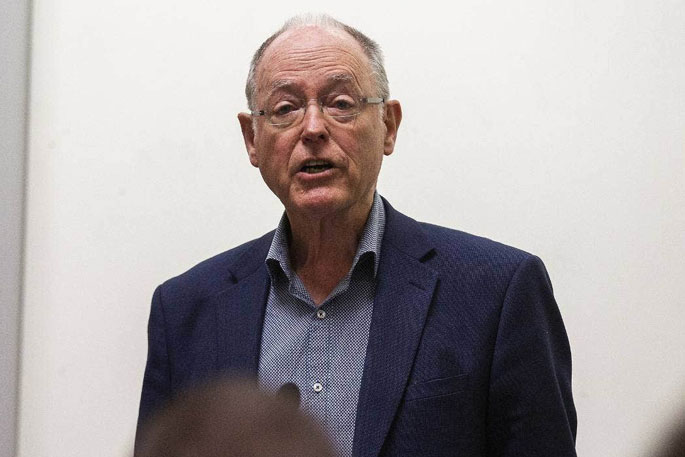Former Reserve Bank governor Don Brash was holidaying in Israel when the Hamas attacks on Israel kicked off on Saturday.
Brash and his partner had been travelling through the Middle East over the past month, visiting Egypt, Jordan and Israel as part of a tour group when the final leg of their trip was cut short.
Brash was in Haifa and had been in Israel for six days when the attacks began in the south of Israel.
On Saturday, the Palestinian militant group Hamas launched an assault on Israel, catching the country off-guard during the Jewish holy holiday season. At least 1600 people are reported to have been killed on both sides as the conflict continues to escalate.
Brash, who arrived back in Auckland on Tuesday morning, describes scenes on the ground in Israel as “surreal”, with locals immediately aware of the magnitude of the situation.
“The sad thing was actually seeing the hotel the ‘safe room’ and shelters. You realise by gosh this is not just playing,” recalls Brash, who is a former leader of the National and ACT parties.
“It was a somewhat surreal feeling in the hotel we were in. There was a room designated as a safe room and in the airport there were lots of signs to shelter. We were conscious of the fact that this was a country in a combat situation.”
His Palestinian tour guide described the situation as “very serious” and likely to go on for months.
Brash was supposed to go to Tel Aviv on Saturday, but changed his flights and returned home about a day earlier than originally planned, flying El Al to Dubai and then on to Auckland.
“There was uncertainty at whether the airport would be open with flights restricted going in and out so late Friday evening we decided that rather than run the risk of waiting until late Saturday evening to catch the flight we were booked on, we would in fact leave the hotel at 2am for a 7am flight out,” says Brash.
“Driving to the airport at 4am in the morning, we probably passed 10 or 12 heavy trucks carrying tanks and a similar number of heavy trucks carrying personnel carriers down the highway heading south.”
Brash has visited Israel twice before, the first time some 20 years ago during his time as Reserve Bank governor to visit Israel’s central bank.
On Tuesday evening, vigils for Israel were held around the country. The event in Auckland’s Aotea Square, drew around 200 people to light candles in remembrance of those that had died during the conflict.
Saturday was described as the darkest day in Jewish history since the end of the Holocaust.
Business community hands on during conflict
Tel Aviv-based Aucklander Elinor Sapir, who leads a tech solutions engineering team at Israeli start-up Rookout, says business has largely been put on hold and Israelis have been focused on helping each other in the best way they can in recent days.
Sapir, who moved to Israel four and a half years ago for work to join the tech scene there, previously worked for IBM and Auckland software company Soul Machines, which creates human-like AI-powered avatars.
The tech solution engineer, who was named on Forbes 30 Under 30 list in 2019 for her work with Soul Machines, says those in her industry have been putting their skills to good use to help the community.
Workplaces that can have gone online and organisations are supporting their employees to volunteer their skill sets in AI and computer vision to help identify bodies, survivors and scrape through social media videos to identify missing people, comply databases of missing people.
“The sheer magnitude of the situation has given everyone the perspective that at the moment, life and helping people that have had to evacuate their houses – and there are thousands of those – or helping soldiers who have had to go into reserves, people who are injured or still missing is number one priority. And that’s the sentiment across the entire country,” Sapir told Stuff.
Sapir has been working with colleagues to raise funds internationally to be used to bring necessary equipment to Israel and raise awareness of the situation overseas.
“My friends have been called up to the army to take part in reserves and the least I can do is make sure that the world understands what’s going on here.”
Sapir says it has been unnerving to have sirens and rockets go off around her, having to rush to bomb shelters in just 90 seconds.
Like most Israelis, Sapir woke up to sirens going off early on Saturday morning, with the attack by Hamas coming as a complete surprise to the nation of 9 million people.
“Normally, when there is tension you know that something is coming, but this was a complete surprise and we had to go to the bomb shelter. We're hearing them going off above us. We had a few times on Saturday, some on Sunday and another yesterday,” said the University of Auckland alumni.
Sapir says she has no plans to leave Israel and will remain there with her husband and family.
Her parents, brother and wider New Zealand-based family are extremely worried by the situation unfolding in Israel, she says.
Sapir says the tech and start-up industries in Tel Aviv have banded together to help the community through the conflict.
“We saw it during Covid and we’re seeing it now, we’re seeing how people are putting businesses aside and seeing how they can leverage the skills that they have to try and help the situation.
“The industry and the tech scene is so strong here that once this is behind us, it will be even stronger. I don’t see this stunting and growth and, if anything, it will bring people closer.”



0 comments
Leave a Comment
You must be logged in to make a comment.